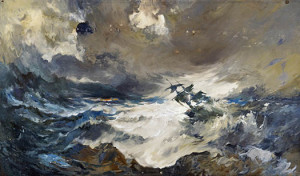“Ill met by moonlight, proud Titania,” reads Karl off the script. He looks confused, “I’m ill?” he looks puzzled. “Am I sick?”
“You’re not sick…We are having a fight!” responds an irritated Nicole, who is playing the fairy queen. She continues to read: “What, jealous Oberon! Fairies, skip hence:/I have forsworn his bed and company.”
“Whoa, looks like someone is sleeping on the couch tonight!” chimes in Sam from the audience.
 Students in English II are acting out scenes from William Shakespeare’s A Midsummer Night’s Dream in preparation for a field trip. Their response to the play is not unlike the response of Shakespeare’s original audiences; there is no high-browed reverence here, but rather a steady stream of commentary coming from the “groundlings” sitting in desks.
Students in English II are acting out scenes from William Shakespeare’s A Midsummer Night’s Dream in preparation for a field trip. Their response to the play is not unlike the response of Shakespeare’s original audiences; there is no high-browed reverence here, but rather a steady stream of commentary coming from the “groundlings” sitting in desks.
A fight between a fairy queen and a fairy king as part of a comedy by Shakespeare is a break from the too serious literature of adventure, war, and tragedy (Animal Farm, Night, Beowulf, All Quiet on the Western Front, Lord of the Flies) that is usually featured in the sophomore curriculum. For two weeks, the students are wrapping themselves in costume tulle, strapping on wings, donning crowns while they stumble through the language of Elizabethan comedy. Their experience is not a singular one.
Today, a student’s first introduction to the Bard usually takes takes place in the classroom. On any given day, at any school hour in classrooms all over this country, students from elementary grades through high school are struggling with iambic pentameter in decoding Shakespeare’s poetic language. This indoctrination is part of a long standing American tradition. Since the beginning of America’s history, Shakespeare has lived on American soil.
-
[fusion_builder_container hundred_percent=”yes” overflow=”visible”][fusion_builder_row][fusion_builder_column type=”1_1″ background_position=”left top” background_color=”” border_size=”” border_color=”” border_style=”solid” spacing=”yes” background_image=”” background_repeat=”no-repeat” padding=”” margin_top=”0px” margin_bottom=”0px” class=”” id=”” animation_type=”” animation_speed=”0.3″ animation_direction=”left” hide_on_mobile=”no” center_content=”no” min_height=”none”]

W. H. Harrington. Wreck of Sea Venture. Painting, 1981. From the Folger Shakespeare Library, Courtesy of Bermuda National Trust and Bermuda Maritime Museum.
Perhaps it was Shakespeare’s fascination with the new colonies in the Americas that initiated the relationship. His play, The Tempest, is loosely based on the 1609 wreck of the Sea Venture near the Bermudas on its way to Jamestown. Prospero and his daughter Miranda are shipwrecked on a island for many years. When visitors arrive after a storm to break their exile, Miranda marvels at the meeting by proclaiming “O brave new world/ that has such people in it.” In the play, Miranda’s line is ironic; she is unaware that several of these visitors were less than desirable types. However, for the British and people in the countries of Europe, the American colonies were the brave New World, full of hope and promise laced with a tantalizing dash of danger and adventure. Americans reciprocated this compliment with a slavish devotion to Shakespeare that continues to this day.
This relationship between Americans and Shakespeare is detailed on the National Endowment for the Arts (NEA) website:
The earliest known staging of Shakespeare’s plays in the colonies was in 1750. By the time of the American Revolution, more than a dozen of his plays had been performed hundreds of times in thriving New England port cities and nascent towns and villages hewn from the wilderness.
By the 1830’s, Alexis de Tocqueville, visiting from France, wrote extensively about his travels in the United States (Democracy in America) noting, “There is hardly a pioneer’s hut that does not contain a few odd volumes of Shakespeare. I remember that I read the feudal drama of Henry V for the first time in a log cabin.”
Shakespeare was embraced by the Americans through their nation’s rapid expansion beyond the original 13 colonies, and the NEA states that “plays were produced in large and opulent theaters and on makeshift stages in saloons, churches, and hotels. From big cities on the East Coast to mining camps in the West, his plays were performed prominently and frequently.” Mark Twain took advantage of American’s familiarity with the troupes of English actors who traveled to the colonies, and incorporated Shakespeare into his classic Huckleberry Finn. Twain’s Huck travels with a pair of con men who practice the balcony scene from Romeo and Juliet and the sword fight from Richard III on the raft while they botch Hamlet’s “to be or not to be” soliloquy. Twain counted on his audience’s acquaintance with Shakespeare’s texts in order to set up this parody.
Interesting historical trivia about Shakespeare in America includes the casting of Lieut. Ulysses S. Grant on the eve of the Mexican War into the role of Desdemona from the play Othello. Apparently he never performed, lacking “the proper sentiment”, and a female was recruited at the last minute to replace him. Edwin Booth, the elder bother of John Wilkes Booth, toured the Western United States during the Gold Rush, and enjoyed enormous acclaim performing plays by Shakespeare. Apparently, the best theaters in the East were not as profitable as performing in the raucous camps where theater tickets were paid for in gold nuggets and bags of gold dust. Edwin is also credited with saving the life of Abraham Lincoln’s son, Robert, on a train platform the same year his brother John Wilkes assassinated Lincoln in 1865.
Contemporary Americans have a deep love for Shakespeare by producing his plays in theaters and in film with more frequency than any other playwright. Almost every state has a theater dedicated to exclusively performing Shakespeare’s plays. Films of his plays, most recently The Tempest starring Helen Mirren as as a female Prospero, or with remakes of his material. The Taming of the Shrew was memorably relocated to an urban high school in Ten Things I Hate about You with Julia Stiles as the intractable Kate, a film that remains popular with American audiences. The Common Core Standards in Language Arts require his plays be taught in classrooms at the high school level. All this attention explains why students willingly (or unwillingly) wrap themselves in costume tulle, wear wings, don crowns and stumble through the language of Elizabethan drama. Like Kyle and Nicole, they may fight in the roles of the Fairy King and Fairy Queen, or they may analyze the reasons Macbeth usurps the throne. They may research the origins for Henry the V’s “Band of Brothers” speech, or memorize the prologue to Romeo and Juliet. Because watching, performing, and learning Shakespeare is an American classroom tradition.[/fusion_builder_column][/fusion_builder_row][/fusion_builder_container]


